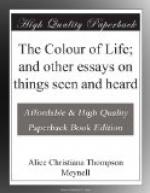A London success, when you know where it lies, is not difficult to achieve. Of all things that can be gained by men or women about their business, there is one thing that can be gained without fear of failure. This is time. To gain time requires so little wit that, except for competition, every one could be first at the game. In fact, time gains itself. The actor is really not called upon to do anything. There is nothing, accordingly, for which our actors and actresses do not rely upon time. For humour even, when the humour occurs in tragedy, they appeal to time. They give blanks to their audiences to be filled up.
It might be possible to have tragedies written from beginning to end for the service of the present kind of “art.” But the tragedies we have are not so written. And being what they are, it is not vivacity that they lose by this length of pause, this length of phrasing, this illimitable tiresomeness; it is life itself. For the life of a scene conceived directly is its directness; the life of a scene created simply is its simplicity. And simplicity, directness, impetus, emotion, nature fall out of the trailing, loose, long dialogue, like fish from the loose meshes of a net—they fall out, they drift off, they are lost.
The universal slowness, moreover, is not good for metre. Even when an actress speaks her lines as lines, and does not drop into prose by slipping here and there a syllable, she spoils the tempo by inordinate length of pronunciation. Verse cannot keep upon the wing without a certain measure in the movement of the pinion. Verse is a flight.
GRASS
Now and then, at regular intervals of the summer, the Suburb springs for a time from its mediocrity; but an inattentive eye might not see why, or might not seize the cause of the bloom and of the new look of humility and dignity that makes the Road, the Rise, and the Villas seem suddenly gentle, gay and rather shy.
It is no change in the gardens. These are, as usual, full, abundant, fragrant, and quite uninteresting, keeping the traditional secret by which the suburban rose, magnolia, clematis, and all other flowers grow dull—not in colour, but in spirit—between the yellow brick house-front and the iron railings. Nor is there anything altered for the better in the houses themselves.
Nevertheless, the little, common, prosperous road, has bloomed, you cannot tell how. It is unexpectedly liberal, fresh, and innocent. The soft garden-winds that rustle its shrubs are, for the moment, genuine.
Another day and all is undone. The Rise is its daily self again—a road of flowers and foliage that is less pleasant than a fairly well-built street. And if you happen to find the men at work on the re-transformation, you become aware of the accident that made all this difference. It lay in the little border of wayside grass which a row of public servants—men with spades and a cart—are in the act of tidying up. Their way of tidying it up is to lay its little corpse all along the suburban roadside, and then to carry it away to some parochial dust-heap.




